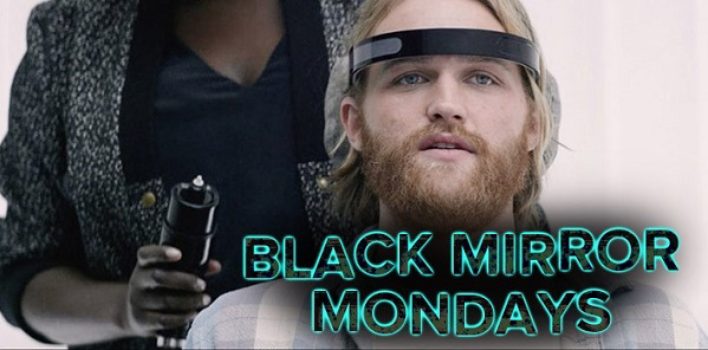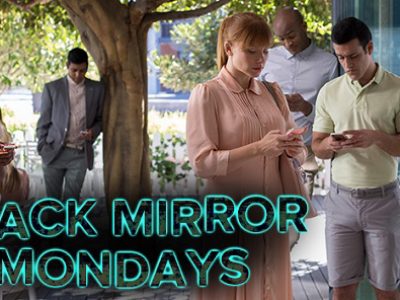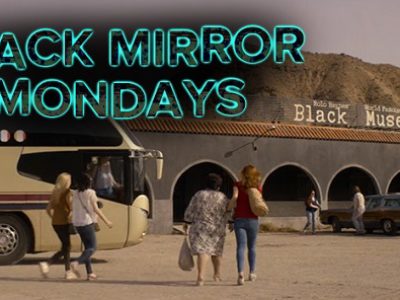Black Mirror S3E2: Playtest
Back when I first began my expedition into Black Mirror, Season 3 was my launch point. The themes centering around technology and how it assists us in propagating our sinful nature certainly intrigued me, but I was equally impressed with the star power and directors the show had accrued for its first season produced by Netflix. Nosedive starred the ever-talented Bryce Dallas Howard and was directed by Joe Wright, who helmed last year’s film Darkest Hour. The second episode of Season 3, Playtest, also stars a familiar face – Wyatt Russell (yes, Kurt Russell’s son), who will next be seen on the big screen in the next Cloverfield film, tentatively titled “Overlord.” Speaking of Cloverfield, Playtest was also directed by a Cloverfield alum, Dan Trachtenberg (10 Cloverfield Lane).
Playtest is about Cooper (Wyatt Russell), an American who is traveling the world and finds himself short on cash after his credit card is stolen. Using an app called “Oddjobs,” he can track down temporary short-term jobs to get enough money to keep his journey alive. With the help of a new tech journalist acquaintance named Sonja (Hannah John-Kamen), he discovers a playtester position for a famous gaming company who is developing a groundbreaking virtual reality game. After Sonja convinces him to apply for the position – and to sneak a photo of the game company’s new tech to stabilize her own job – Cooper is selected for the position and begins his experience with the company, SaitoGemu.
After a device is attached to Cooper’s neck to monitor his vitals and senses, the testing begins almost immediately, projecting augmented reality images into his vision. Cooper’s experience quickly progresses from a simple whac-a-mole game to the eventual main attraction – an entire abandoned mansion serving as a “house of horrors,” where everything rendered in the house is taken from Cooper’s own memories and fears. The idea of a haunted house showcasing your worst fears, forcing you to relive terrifying scenes from your past or confirming your own paranoia, just may be one of the scariest ideas a Halloween attraction addict could conjure up. And as one would expect, the situation into which SaitoGemu’s haunted mansion throws Cooper becomes very personal, very quickly.
 Trachtenberg is a director who excels in bringing a large amount of action and drama into a confined space. While the world of Playtest may seem more open compared to 10 Cloverfield Lane, or even to his first film, which is a short Portal fan film called No Escape, it’s incredibly similar in tone. One man trapped in an unfamiliar, creepy location, with people he doesn’t know he can trust, as more and more obstacles block his escape route. For example, Cooper’s earpiece he uses to communicate with SaitoGemu’s employees eventually malfunctions, and he’s left to defend himself against the virtual reality horrors. As the terrors become more visceral, the attacks become more frequent. Because of the implant, Cooper also feels pain from those who physically attack him in the house, even though there’s no real wound.
Trachtenberg is a director who excels in bringing a large amount of action and drama into a confined space. While the world of Playtest may seem more open compared to 10 Cloverfield Lane, or even to his first film, which is a short Portal fan film called No Escape, it’s incredibly similar in tone. One man trapped in an unfamiliar, creepy location, with people he doesn’t know he can trust, as more and more obstacles block his escape route. For example, Cooper’s earpiece he uses to communicate with SaitoGemu’s employees eventually malfunctions, and he’s left to defend himself against the virtual reality horrors. As the terrors become more visceral, the attacks become more frequent. Because of the implant, Cooper also feels pain from those who physically attack him in the house, even though there’s no real wound.
As Cooper transforms into a truly broken man, we learn more about his past, and about the things that truly scare him. We learn that Cooper was “walking the earth” because he’s trying to distance himself from his mother after their father died due to early-onset Alzheimer’s. Cooper can’t connect with his mother any longer nor deal with his father’s passing, and instead of facing the fear of a new life without his father – and the fact that he could end up like him – Cooper leaves, prompting his mother to keep calling him on the phone. It’s a typical motherly response – wondering about the well-being of her child – and if she wasn’t calling him repeatedly, we would have to wonder about her own mental health. But as the virtual world projects Cooper’s most private fears, we should also wonder what’s more terrifying – a virtual world that illustrates our brokenness and fears from our own memory, or actually dealing with them in reality.
 The final scenes of Playtest are shocking, mind-bending, and riveting, and I would be doing it a disservice to recount all those details here. But as one could imagine – this is Black Mirror after all – it doesn’t end well for our protagonist. Cooper’s refusal to answer his mother’s phone calls becomes his literal undoing. Russell does an incredible job of portraying Cooper, making him relatable and enjoyable to audiences, and it’s heartbreaking to witness his performance as Cooper essentially disintegrates.
The final scenes of Playtest are shocking, mind-bending, and riveting, and I would be doing it a disservice to recount all those details here. But as one could imagine – this is Black Mirror after all – it doesn’t end well for our protagonist. Cooper’s refusal to answer his mother’s phone calls becomes his literal undoing. Russell does an incredible job of portraying Cooper, making him relatable and enjoyable to audiences, and it’s heartbreaking to witness his performance as Cooper essentially disintegrates.
The fears we house inside our hearts and minds almost always stem from unfinished business of some kind, business which we have yet to reconcile with or overcome. It doesn’t matter if it’s something as simple as arachnophobia, or the constricting fear of losing a loved one. Fear breeds in the unknown, and the more we stress about the unknown the more fear festers and takes us over, like a virus wiping out a computer’s ability to function. Even Jesus, while praying in the Garden of Gethsemane, was in such agony about what would happen to Him that He sweated blood, as recorded in Luke 22:44
“And being in agony He was praying very fervently; and His sweat became like drops of blood, falling down upon the ground.” (NASB)
It’s understandable why Jesus, fully God yet fully man, was experiencing such intense sorrow and anguish. He knew, in painstaking details, everything that would soon happen to Him. He was about to experience the most torturous method of execution ever devised by man. While Jesus knew that the Father’s will would be done and certainly didn’t fear what would come from His crucifixion, it was the thought of experiencing all the hell we humans could dish out on one man that made him sweat blood. His blood was shed because we were not yet reconciled, and death was not yet overcome.
 While I still felt remorse for what happened to Cooper in Playtest, it was the haunting images of his mother’s unanswered calls that shook me during my last rewatch. One of the things we fear the most is not being able to tell a loved one how much we love them, and how much they mean to us; the underlying fear, of course, being the unknown time of their passing, and that it will catch us off-guard. It seems that James, the brother of Jesus, understood this quite well, as he writes in his epistle,
While I still felt remorse for what happened to Cooper in Playtest, it was the haunting images of his mother’s unanswered calls that shook me during my last rewatch. One of the things we fear the most is not being able to tell a loved one how much we love them, and how much they mean to us; the underlying fear, of course, being the unknown time of their passing, and that it will catch us off-guard. It seems that James, the brother of Jesus, understood this quite well, as he writes in his epistle,
“Come now, you who say, ‘Today or tomorrow we will go to such and such a city, and spend a year there and engage in business and make a profit.’ Yet you do not know what your life will be like tomorrow. You are just a vapor that appears for a little while and then vanishes away. Instead, you ought to say, ‘If the Lord wills, we will live and also do this or that.’” (James 4:13-15 NASB)
 If I’m honest, this vapor metaphor illustrates a fear I’ve been harboring lately in my heart. In just the past week, a good family friend of mine died suddenly. No previous warning signs were shown – he was gone in the blink of an eye. Another friend, this time from my church family, also died suddenly. There’s something surreal about attending two memorial gatherings/visitations in the span of two hours, which is what I experienced just yesterday. What eats away at me is the fact that I don’t remember the last things I said to these people. I know I didn’t tell them explicitly, to their face, what they meant to me. In some ways, I certainly feel like I took them for granted. I can guarantee you that if those two people could talk to me now, they would tell me not to worry about that, but the guilt remains. I know so many others that harbor similar regrets.
If I’m honest, this vapor metaphor illustrates a fear I’ve been harboring lately in my heart. In just the past week, a good family friend of mine died suddenly. No previous warning signs were shown – he was gone in the blink of an eye. Another friend, this time from my church family, also died suddenly. There’s something surreal about attending two memorial gatherings/visitations in the span of two hours, which is what I experienced just yesterday. What eats away at me is the fact that I don’t remember the last things I said to these people. I know I didn’t tell them explicitly, to their face, what they meant to me. In some ways, I certainly feel like I took them for granted. I can guarantee you that if those two people could talk to me now, they would tell me not to worry about that, but the guilt remains. I know so many others that harbor similar regrets.
Maybe we should be better about picking up the phone when family and friends call us.








